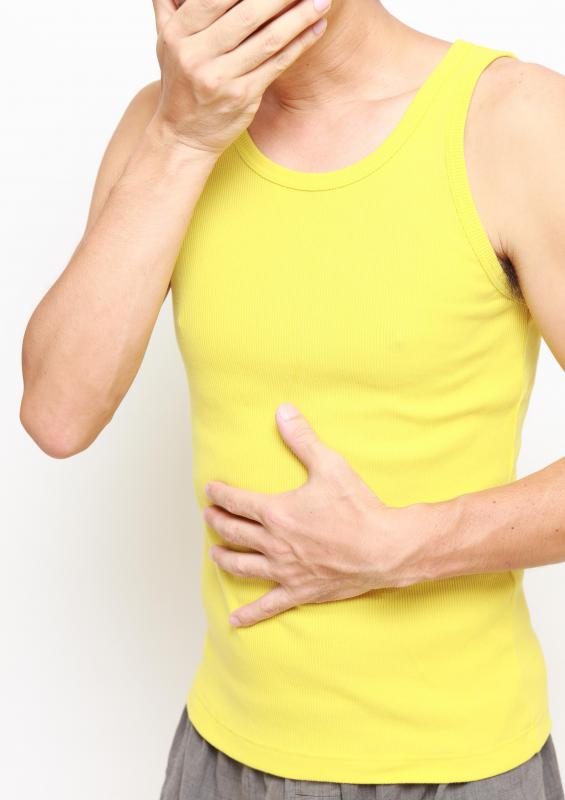At TheHealthBoard, we're committed to delivering accurate, trustworthy information. Our expert-authored content is rigorously fact-checked and sourced from credible authorities. Discover how we uphold the highest standards in providing you with reliable knowledge.
What is Biliary Dyskinesia?
Biliary dyskinesia is a disorder of the gallbladder. The gallbladder stores bile from the liver and releases it into the small intestine, where it breaks down fats taken in during a meal. Bile travels from the gallbladder through the common bile duct to the small intestine. If bile is not secreted from the gallbladder or cannot get through the common bile duct, it will back up in the gallbladder, causing biliary dyskinesia.
When a person ingests a meal, a hormone known as cholecystokinin is secreted by cells in the small intestine. Cholecystokinin binds to receptors distributed in the muscle of the gallbladder and this causes the gallbladder to contract. The bile is emptied from the gallbladder and travels to the small intestine. If a patient is suffering from biliary dyskinesia, the gallbladder does not contract properly.

There are three round muscles at the end of the common bile duct that are known as the sphincter of Oddi. In addition to causing the gallbladder to contract, the hormone cholecystokinin binds to receptors on the sphincter of Oddi and signals these muscles to relax. Bile can then flow into the small intestine. If the muscles of the sphincter of Oddi do not function properly, bile will not pass through the common bile duct; it will remain in the gallbladder.

Pain and abdominal cramping are the primary symptoms of gallbladder disease. Biliary dyskinesia, which does not involve the formation of gallstones, is sometimes referred to as acalculous gallbladder disease. The physician will need to do a complete examination with diagnostic testing to rule out gallstones before treatment can begin.
Diagnostic testing involves blood work to evaluate liver function and levels of bilirubin. An ultrasound may be done to rule out the presence of gallstones. If the patient does not have gallstones, further testing will need to be done to make a diagnosis.

In many cases, the patient will be referred for nuclear medicine testing in which a radioactive substance is injected into the bloodstream. This radioactive substance will collect in the gallbladder. The physician will then be able to track the flow of the substance and the rate of secretion from the gallbladder.
Once the patient has been diagnosed with biliary dyskinesia, the most common treatment is removal of the gallbladder. Gallbladder removal is a surgical procedure known as laparoscopic cholecystectomy. This surgery is done as an outpatient procedure while the patient is under general anesthesia. Most patients will experience normal digestion and a reduction in abdominal pain following this surgery.
AS FEATURED ON:
AS FEATURED ON:















Discussion Comments
My doctor told also told me that it was common for gallbladder disease to be hereditary. He also told me removing the gallbladder was only 30 percent successful. That is why I have decided not to have mine removed and I have been dealing with this from the age of 18 and I turn 40 this Friday.
It had gotten to the point that even soup would trigger an attack. As of six weeks ago,I changed my diet to an all plant based diet and I haven't had an attack in six weeks, I have dropped 19 pounds and I actually feel better all around. I have more energy and I don't feel like I am poisoned all the time.
My daughter has been showing signs of something going on with her gallbladder after she eats out and she just turned 18 this past November. Sigh.
@bagley79 - My doctor told me that it can be common for gallbladder disease to be hereditary. I had chronic cholecystitis for many years before I finally went ahead and had surgery to remove my gallbladder.
I was hoping I could avoid surgery by watching my diet, but eventually my pain was bothering me most of the time.
For many years it seemed like it would come and go, so I never wanted to have my gallbladder removed. Both of my parents ended up having gallbladder surgery, so I am not surprised I ended up having the same thing.
Most doctors will perform this surgery by laparoscope, so that is why it is usually done as an outpatient. This is so much better than the way they used to remove your gallbladder.
Is gall bladder dyskinesia something that is hereditary? Both of my grandmothers and my dad have had their gallbladder removed.
I have noticed my stomach hurts after I eat a big meal, or have greasy, spicy food. I am worried it is my gallbladder since I have had several family members that have had problems with this.
If this is something that is hereditary, it would make sense that my problems would be related to my gallbladder.
It is nice to know the recovery time after surgery is not very long. My relatives had this surgery several years ago, and they were all in the hospital for at least a week before they were able to go home.
I have had my gallbladder removed and it was such a relief to get rid of my abdominal pain and discomfort.
My biliary dyskinesia diagnosis was only done after several tests, and they ruled out other causes of my symptoms.
The first thing they did was an ultrasound to rule out any gallstones. When this turned out to be negative, I had a HIDA scan done to see how my gallbladder reacted to dye that was injected in my system.
After this test, they determined my gallbladder was bad and scheduled me for surgery. Since this was done on an outpatient basis, the recovery time wasn't too bad, and I haven't had any problems since.
Post your comments